Phenylephrine hydrochloride - widely used drug in various fields of medicine. This substance is a powder. Its color is white or with a yellow tint. The substance is highly soluble in water or alcohol. Its main substance is phenylephrine hydrochloride.
Record content:
- 1 Properties and action
- 2 Phenylephrine hydrochloride application
- 3 Release form, trade names
- 4 Indications
- 5 Contraindications
- 6 Side effects
- 7 special instructions
-
8 Instructions for use
- 8.1 ENT drugs
- 8.2 Ophthalmic drugs
- 8.3 Parenteral drugs
- 9 Overdose
- 10 Interaction with other drugs
- 11 Where can I buy
- 12 Storage conditions and periods
- 13 Analogs
- 14 Price
- 15 Video about drugs with phenylephrine
Properties and action
The drug is an alpha-adrenergic agonist and belongs to the pharmacological group of anticonvulsants. The drug has a vasoconstrictor effect, has alpha-adrenomimetic activity. The active substance has a stimulating effect on postsynaptic receptors, enhances the work of alpha-adrenergic receptors.
When ingested, the substance causes an increase in blood pressure and general resistance of the peripheral vessels, due to the narrowing of the arterial vessels. At the same time, there is a slight stimulation of the spinal cord and brain.
The drug has a depressing effect on the blood flow. Narrowing of blood vessels in the lungs leads to an increase in pressure in the pulmonary arteries.
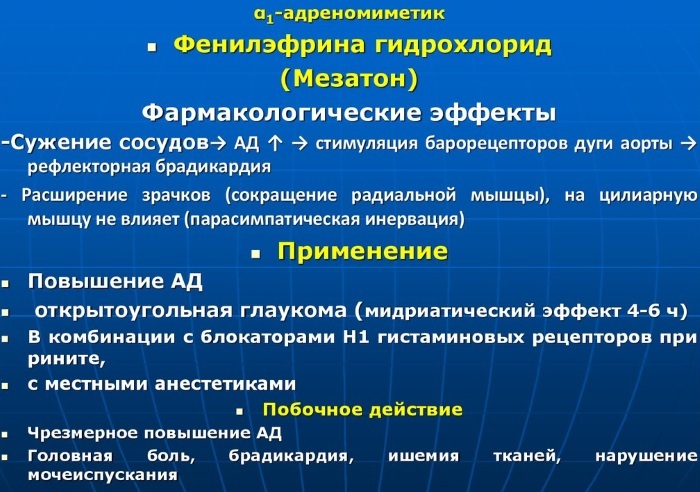
The tool eliminates hyperemia and swelling in the nasal cavity, reduces the level of nasal discharge, and normalizes respiratory function. At the same time, there is a decrease in pressure in the middle ear and paranasal membranes.
When used in ophthalmic practice, it leads to a narrowing of the vessels located in the conjunctival region. The drug causes dilatation of the pupil and normalizes the processes in the intraocular fluid. The pupils return to their normal position after 4-6 hours. after using the medication. At the same time, there are no negative symptoms.
With local use of the drug in ophthalmology, mydriasis is observed within 10-60 minutes. after instillation. In some cases, within half an hour after using the medicine, small deposits of pigments may be observed in the intraocular fluid.
The drug exhibits local absorbing properties. The agent is metabolized in the gastrointestinal tract and liver. It is excreted in the form of metabolites by the renal system. When administered intravenously, the effect of the agent is noted after 20 minutes.
There is evidence of the use of the drug as anesthesia, with anaphylactic conditions, anuria, tachycardia, priapism, arrhythmias.
Phenylephrine hydrochloride application
Phenylephrine hydrochloride is a medicinal preparation in the form of a solution, which is widely used in various fields of medicine. The substance is used for ophthalmic disorders, as well as in the presence of diseases of the upper respiratory tract. In the form of a solution, the agent is used as a local anesthetic.
Release form, trade names
This drug is available in various forms and types.
Release options:
- Nasal drops - Mezaton, Nazol Baby, Polydex.
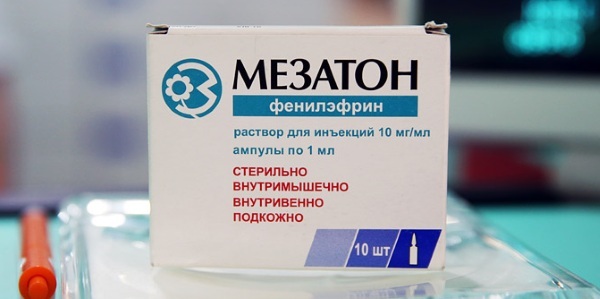
- Solution for intravenous and intramuscular injections - Mezaton.
- Ophthalmic drops - Mezaton, Irifrin, Visofrin.
The presented forms are preparations containing an active substance. In some cases, phenylephrine can complement the action of other active ingredients.
Indications
The indications for the appointment are various pathologies of the eyes and upper respiratory tract. The medicine is used depending on the form being dispensed.
Parenteral use:
- low blood pressure (acute form);
- shock, including toxic and traumatic form;
- local anesthesia;
- insufficiency of the functions of blood vessels.
ENT practice (in the form of drops or nasal spray):
- respiratory pathology;
- flu;
- the development of hay fever;
- other allergic diseases, the symptoms of which are associated with sinusitis or rhinitis.
Application in ophthalmology (in the form of a drop solution):
- pupil dilation - when carrying out various studies of the eye;
- anterior uveitis;
- diagnostics aimed at detecting angle-closure glaucoma;
- examination of the eyeball;
- surgical interventions where temporary expansion of the pupil is necessary;
- operations using laser exposure;
- Posner-Schlossmann syndrome;
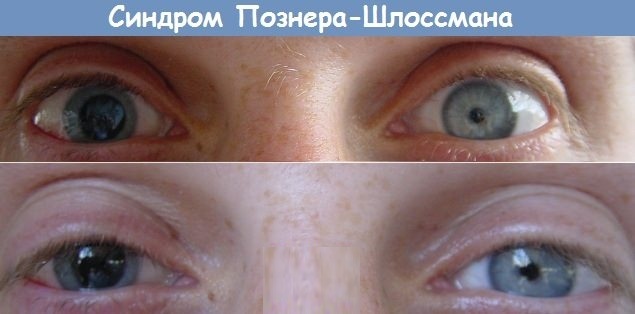
- treatment of red eye syndrome.
Additional use of the product is possible after prior consultation with a specialist.
Contraindications
Pheniephrine hydrochloride is a topical solution that has some restrictions on its use. Contraindications to taking the drug are established depending on the dosage form used. A general contraindication is intolerance to the main or auxiliary components.
Injection solution:
- high blood pressure;
- OGKMP;
- severe forms of atherosclerosis;
- ventricular fibrillation;
- severe course of ischemic disorders;
- heart failure (decompensated form);
- the presence of pheochromocytoma;
- diseases of the cerebral arteries.
Ophthalmic drops:
- elderly patient with signs of heart failure;
- surgical interventions for a damaged eyeball;
- narrow-angle or closed-angle form of glaucoma;
- surgical interventions for dysfunction of lacrimation;
- the presence of liver porphyria;
- thyrotoxicosis;
- damage to the arteries by aneurysm;
- underweight in children;
- children under 12 years of age.
Nasal drops:
- violations in the field of the cardiovascular system;
- diabetes;
- hyperthyroidism;
- hypertensive crisis.
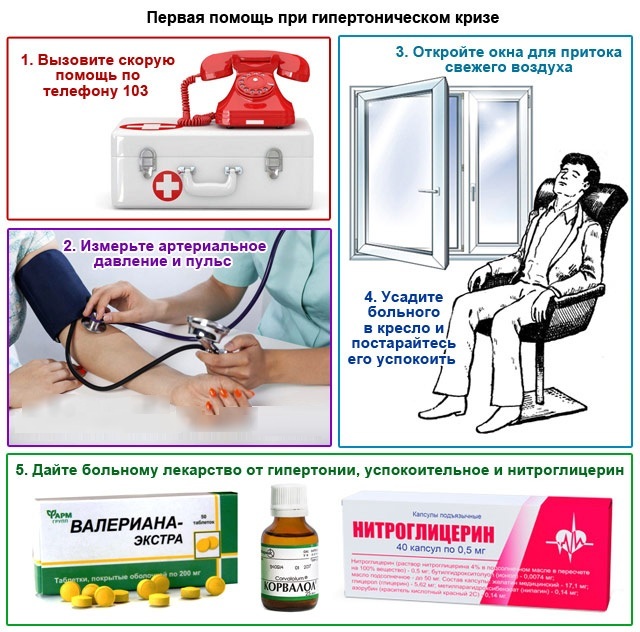
Nasal spray:
- pathology in the field of the cardiovascular system;
- hyperthyroidism;
- high blood pressure;
- diabetes;
- age up to 6 years.
Before using the product in childhood or old age, constant monitoring of the patient's condition is required. In newborns, this medication is prohibited for use.
Side effects
Phenylephrine hydrochloride can have a negative effect on the patient's body, causing various reactions.
Side effects:
- Cardiovascular disorders, hematopoietic system: increase or decrease in pressure, irregularities in the rhythm and heart rate, bradycardia, occlusive disease of the coronary arteries, blockage of the arteries located in the lungs. In some cases, in patients with heart failure, the medication has led to a heart attack.
-
Central nervous system and sensory organs: the development of dizziness and headaches, restless or irritable state, general weakness, sleep disorders, paresthesia, tremors in the body. The use of ophthalmic drops led to the development of miosis or mydriasis on the next day of treatment. There was also an increase in pressure in the eye area.
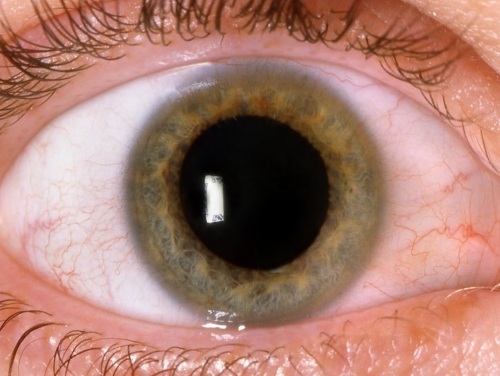
- Other reactions: development of vomiting and nausea, depression of respiratory functions, scanty urine flow, increased sweating, pale skin, increased acid-base balance in the body.
- Local reactions (when using an injection solution): ischemic lesion of the skin at the injection site, necrotic lesion, scab formation. With the use of ophthalmic drops, the development of irritation and burning, fog before the eyes was observed, an increase in lacrimation and discomfort occurred. When used in ENT practice, the drops caused a tingling and burning sensation in the area of mucous membranes.
With the development of side effects, including symptoms not listed in the official instructions, you should immediately seek medical help.
special instructions
During the period of use of the drug, it is necessary to monitor cardiac functions, blood pressure, and also monitor blood circulation. In the presence of high pressure, it is necessary to ensure that its level is 30-40 mm Hg. below the usual rates. In the treatment of shock syndrome, treatment of concomitant diseases is required.
With a sharp increase in blood pressure, as well as with a change in the frequency or rhythm of the heart, it is recommended to abandon the further use of the medication. If there is a high risk of lowering blood pressure, it is recommended to gradually reduce the dosage of the drug.
The medication is capable of causing systemic effects. Therefore, it is not recommended to use it in therapy for newborns, as well as for the elderly.
Great care should be taken when using a solution with MAO inhibitors, including the period (at least 3 weeks) after their cancellation. During the period of taking the medicine, it is forbidden to drive a car or engage in potentially hazardous types of work that require high psychomotor reactions.
Instructions for use
The use and dosage of a medicine depends on the dosage form used.
ENT drugs
The most popular phenylephrine nasal spray is Polydex. The product also contains anti-inflammatory and glucocorticosteroid components. This drug is used for nasal instillation.
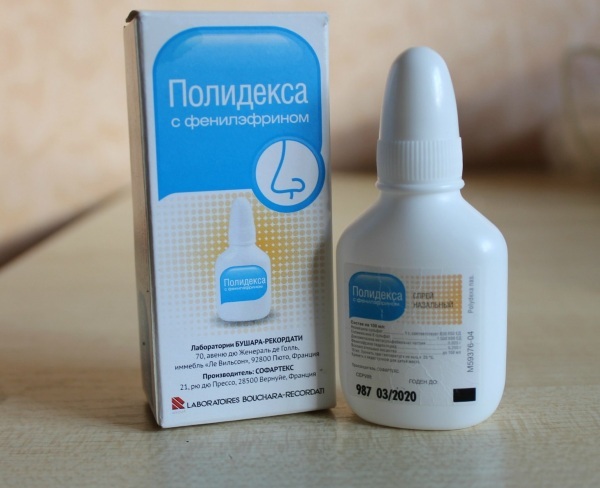
Adults are prescribed 1 spray in each nostril. The procedure is repeated 3 to 5 times a day. Children are shown 1 injection up to 3 times a day. The duration of the course is from 5 days to 1.5 weeks. Age restrictions - from 2.5 years.
Ophthalmic drugs
Irifrin is used to instill eyes. To dilate the pupils, 1 drop of a 2.5% solution is prescribed. In adults and children from 12 years old, with complex pathologies of the iris, a 10% concentration of the solution is used. In this case, the dosage remains the same.
To eliminate spasmodic conditions in adults and children from 6 years old, 1 drop of a low concentration agent is prescribed. The procedure is carried out at night. Treatment should be at least 1 month. In the presence of glaucoma and iridoclitis, 1 drop of the drug is prescribed 2 to 3 times a day.
Before carrying out operational actions, a 10% concentration of the solution is used. The dosage is 1 drop in each eye. Other dosage features are developed by the treating ophthalmologist, depending on the disorder or surgery.
Parenteral drugs
Metazone is used as an injection. In case of collapse, a 1% solution is prescribed. The agent is injected into a vein at a dosage of 0.1 to 0.3 ml. Before use, the solution is diluted with dextrose or sodium chloride.
With intramuscular injections, adults are prescribed 0.3-1 ml of the drug. Repeat injections 2-3 times a day. In this case, the maximum daily dose should not exceed 25 mg. Children are prescribed a dosage based on body weight - 0.5-1 mg / kg. The allowed age is over 15 years old.
Overdose
If the indicated dosages are exceeded, the development of a negative effect of the drug is possible.
Overdose signs:
- significant increase in blood pressure;
- development of ventricular premature beats;
- a feeling of heaviness in the head, arms and legs;
- development of tachycardia (ventricular form).
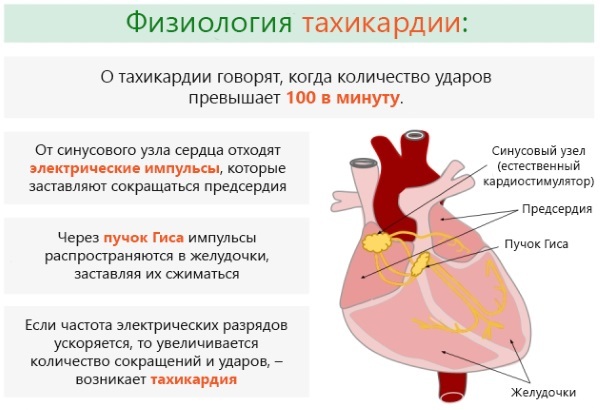
With the development of symptoms of an overdose, intravenous administration of alpha and beta blockers is prescribed. Further therapeutic actions are developed by a specialist, taking into account the symptoms of intoxication.
Interaction with other drugs
The vasoconstrictor effect may decrease with the simultaneous use of the solution and adrenergic blockers. A similar effect is observed with the use of diuretics.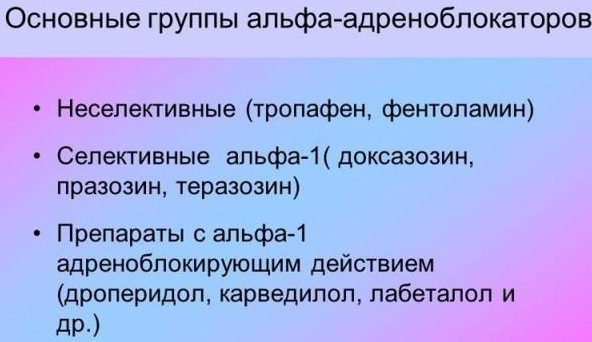
The risks of developing ventricular fibrillation increase significantly when the drug is taken with other topical anesthetics. With the combined appointment of a solution and reserpine, the risks of an increase in pressure significantly increase. Before taking other medicines at the same time as the solution, you should consult with your doctor.
Where can I buy
You can buy the drug at any private or public pharmacy or specialized medical an institution that is certified and licensed to sell medical products the population. The product is dispensed with a doctor's prescription.
Storage conditions and periods
- The solution must be stored in a dry place at temperatures up to 25 0C.
- The shelf life of the product is 12 months. After opening the bubble, the drug is allowed to be used within 1 month.
- Do not use the medication after the expiry date expired on the package.
Analogs
Phenylephrine hydrochloride is a broad-spectrum medical solution that, in some cases, can lead to the development of hypersensitivity reactions. If such manifestations occur, it is recommended to replace the drug with another similar agent.
Analogs:
-
Irifrin. This drug is a representative of the group of adrenergic drugs. A medication is produced in the form of a solution for the eyes.
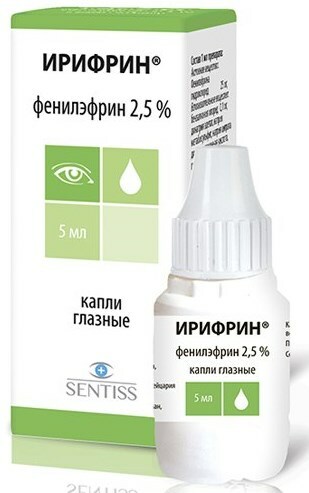
Irifrin The agent is used in the development of iridocyclitis, red eye syndrome, as well as during diagnostics or surgical actions in which it is necessary to cause temporary dilation of the pupil (mydriasis). The dosage is calculated according to the area of application and is prescribed by the treating ophthalmologist. The medication has contraindications, including children under 12 years of age, therefore, a doctor's consultation is required before using the drops. Terms of sale - by prescription.
- Mezaton. This medication comes in the form of nasal drops. The remedy is used for flu and colds, accompanied by nasal congestion. Additional indications for appointment: hay fever, acute rhinitis and sinusitis. Children are prescribed 1 drop per day up to 4 times. Adults and children after 6 years of age are prescribed 3-4 drops in each nostril. The duration of treatment is set individually. Contraindications: atherosclerotic arterial disease, the development of angina pectoris, diabetes mellitus, hypertensive crisis. It is recommended that you consult with your healthcare professional before using this medication. The conditions for dispensing the drug from pharmacies are prescription. The cost of Metazone in Moscow pharmacies is from 560 rubles. per bottle.
- Adrianol. This medication is manufactured at a pharmaceutical plant in Serbia. The agent is available in the form of a nasal spray and is prescribed in the treatment of acute rhinitis or sinusitis. Also, the medicine can be used to prevent the development of edema during diagnostic or surgical procedures. Children from 3 years old are prescribed 2 drops of solution in each nostril 3 times a day. Children from 7 years old, as well as adult patients, are prescribed 1-3 drops of the drug up to 4 times a day. The treatment is carried out for 7 days. Re-use of the spray is possible after a break and after consulting a specialist. The tool has extensive contraindications, therefore, before using it, you need to consult with an ENT specialist. Terms of dispensing from pharmacies - by prescription. The cost per bottle is from 100 rubles.
Phenylephrine hydrochloride is a therapeutic agent that should be replaced by analogs only after prior consultation with the attending specialist.
It is forbidden to independently select similar drugs.
Price
The cost of a drip solution may differ from each other, as well as from similar drugs, depending on the region and region of sale.
| Main drug | Price | Analogs | The price of analogs |
| Phenylephrine (eye drops, 2.5%) | RUB 199-505 | Irifrin, 2.5%, 5 ml | RUB 539-1259 |
| Phenylephrine (nasal drops) | RUB 199-505 | Adrianol (nasal drops, 10 ml) | RUB 50-313 |
| Phenylephrine (injection) | RUB 199-505 | Mezaton (solution for injection, 1 ml) | RUB 37-119 |
Before taking phenylephrine hydrochloride or other similar drugs, you should carefully read the instructions for use of the drug and consult your doctor. It is also recommended to read the reviews of patients who have used this drug.
Video about drugs with phenylephrine
About eye drops Mezaton:



